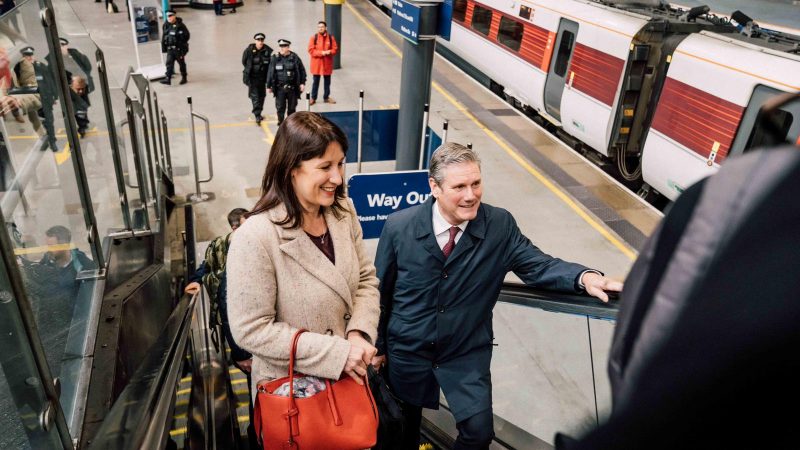
1. Keir Starmer hints Labour could hold back in favour of Lib Dem candidates
In a Times Radio interview, Keir Starmer hinted that Labour could hold back in constituencies targeted by the Lib Dems at the next general election in his bid to deprive the Tories of a majority. The Labour leader said there should be a Labour candidate people can vote for “wherever they live”, but added that his party would focus on “the places where we can win and we know we have to win”. On the two by-elections that saw the Lib Dems overturn Conservative majorities this year, he said: “Chesham and Amersham, North Shropshire are not on my list of target seats. Am I pleased to see the Tories upended there? Yes, I am.” It suggests there will be no formal or even informal pacts between Labour and other opposition parties, but it is hoped a ruthless targeting of resources could produce the same effect.
2. Rachel Reeves rejects nationalisation of water
“I actually don’t think you need to nationalise to stop the sewage from going into the sea,” Rachel Reeves, the Shadow Chancellor, said in a Guardian interview on December 26th. “You just need much tighter regulation.” Her comment followed the row that erupted in October when the government refused to stop water companies discharging sewage into UK waterways. Sticking to her message of fiscal discipline, Reeves emphasised that cost was an issue: “The truth is, we’ve got debt as 100% of GDP. A Chancellor can’t say yes to everything. You’ve got to decide what the priorities are.”
Reeves struck an optimistic tone during the interview. She declared that Labour is in its strongest position in ten years and concluded that concerns over energy prices and increasing taxes were feeding into widespread anger about Tory rule-breaking. The same themes did not stop a strong result for the Conservatives in elections earlier this year, the Labour frontbencher acknowledged, but they are gaining more traction now, she said.
3. Labour draws level with the Tories on economic management
Asked which party in government would be best at handling the economy, respondents to an Opinium poll published on December 27th had Labour and the Conservatives neck and neck. Keir Starmer’s and Boris Johnson’s parties were each backed by 31% of people on economic management. 23% said neither, while 15% told the pollster they did not know.
Opinium also had Labour seven points ahead of the Tories on general voting intention (39% versus 32%) and had Labour ahead of the Tories in Scotland for the first time since the start of the polling series in March.
4. David Lammy issues an apology
Over the festive break, David Lammy apologised for nominating Jeremy Corbyn to be the leader of the party in 2015. Speaking at this year’s Limmud festival, the Shadow Foreign Secretary said he “never believed” Corbyn would become leader but that the nomination was a “mistake”, adding: “If I knew what I do now, I never would have nominated him.”
The foreign affairs spokesperson told the festival that Labour is still “on a journey” in improving its relationship with Britain’s Jewish community and that individuals with antisemitic views remained in the party. He said: “I don’t believe the overall culture is toxic any more… but until the party is genuinely welcoming for everyone, we remain on a journey.”
5. The Labour leadership primes a new crop of “normal” candidates
The Labour leadership is preparing to bring forward a new cohort of “normal” and “competent” future parliamentary candidates, PoliticsHome reported. Although a general election is not likely to take place next year, reselections for Labour candidates are underway. A number of veterans have announced they are standing down, and the Conservatives hold several traditionally Labour ‘Red Wall’ seats by slim majorities.
Starmer told a recent national executive committee meeting that the party “can’t afford any more Mike Hills or Claudia Webbes” (Hill resigned following claims of sexual misconduct, while Webbe was expelled after being found guilty of harassment). NEC member Luke Akehurst said: “Keir Starmer has made it very clear to the NEC that it’s a huge priority for him that we have the highest quality possible candidates standing for Labour in the general election.”
6. Labour gets good news from the ‘Red Wall’
Red Wall voters who deserted Labour in the 2019 general election are turning away from the Tories in favour of Starmer’s party, according to polling last week. The survey, commissioned by The Mail on Sunday, placed Labour ahead in Red Wall seats for general voting intention (49% vs 33%). The research by Deltapoll also found that all 57 constituencies gained by Boris Johnson in the North and Midlands doubted that he would be in the role in 12 months’ time – and that 38% of voters thought Starmer would make the best Prime Minister, while 33% backed Johnson.




More from LabourList
Letters to the Editor – week ending 1 March 2026
‘I spent years telling workers the law couldn’t help them – that has changed’
Josh Simons resigns as Cabinet Office minister amid investigation